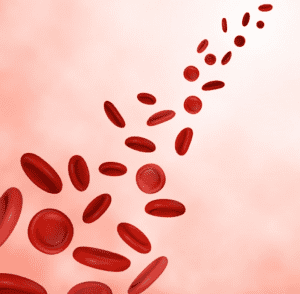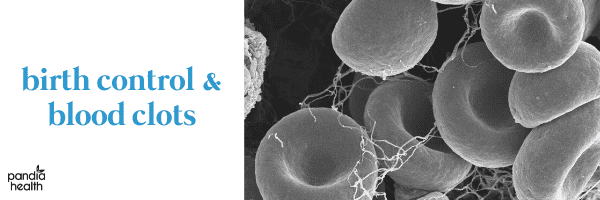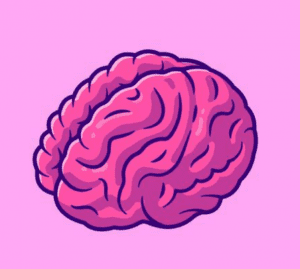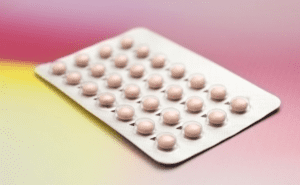Medically reviewed by Sophia Yen, MD, MPH – Written by Varuska Patni. Updated May 13, 2021
Hormonal Birth Control and the Risk of Blood Clot Formation
Millions of women use hormonal birth control to prevent unintended pregnancy, regulate hormones, and manage unpleasant period symptoms. Although these methods are proven safe and effective for the vast majority of people with uteri, there are some circumstances in which it might be better to use another form of contraception. While there are multiple factors that could impact whether or not an individual is prescribed hormonal birth control, the following article will specifically cover blood clots.

What is a blood clot?
Human blood consists of several clotting agents that allow the body to repair itself in the event of injury. These are necessary in normal amounts, but can become dangerous if present in certain areas of the body (i.e. veins, arteries, and capillaries). When a blood clot forms, it can become stuck and lead to life-threatening health conditions such as heart attack and stroke. There are multiple types of blood clots, but the two that are most likely to be impacted by birth control are deep vein thrombosis (DVT) and pulmonary embolisms (PE).
Deep vein thrombosis
A DVT is a clot that forms inside the deepest veins of the body specifically in the legs or the arms. The signs of this type of blood clot include:
- Swelling (around where the clot has formed)
- Leg or arm pain and tenderness (may feel similar to a cramp)
- Red or blue skin discoloration at the clot site
- Warmth of the skin
Pulmonary embolism
Sometimes, the clots that form in a DVT can break apart and travel up to the lungs, causing a pulmonary embolism. This type of blood clot is very dangerous, as it can have serious consequences if left untreated. Furthermore, it is important to be cognizant of the signs and symptoms. Contact a doctor immediately if you notice any of the following:
- Shortness of breath
- Chest pain that gets worse when you take a deep breath
- Elevated heart rate (higher than what is normal for your body)
- A bloody cough
Even if it turns out that what you are experiencing is not a blood clot, it is always a best practice to monitor your symptoms in order to prevent health consequences down the line.
What does a blood clot feel like?
A blood clot can appear in many areas of the body including, but not limited to the legs, chest, abdomen, and brain. Depending on their location, symptoms may vary.
Legs:
- Swelling
- Redness
- Pain
Chest:
- Shortness of breath that isn’t caused by exercise
- Rapid heart rate
- Possibly a cough
- Angina (chest pain)
Abdomen:
- Stomach pain
- Bloating
- Vomiting
Brain:
- Weakness or numbness on one side of body
- Vision disturbances
- Difficulty speaking
- Inability to walk
- Poor concentration
It is possible to have a blood clot and not experience any symptoms. If you notice physical signs, even without symptoms, consult your doctor. The sooner a blood clot is detected, the less likely you are to experience permanent harm.
What are risk factors for blood clots?
While any individual can develop blood clots, certain conditions may put you at greater risk. Genetics play some role, but lifestyle factors may also come into play. Some of the more common risk factors include:
- Personal or family history of blood clots
- Pregnancy and the first six weeks after having the baby
- Obesity (BMI above 30)
- Undergoing surgery
- Taking hormonal birth control that contains estrogen
- Blood clotting problems like Factor V Leiden
- Sitting still for a long period of time (i.e. during a car ride or plane flight)
Although applying to one or more of the above list does not guarantee that you will get a blood clot, noting these risk factors could help you pay closer attention to any potential signs.
How does birth control impact the formation of blood clots?
In some cases, taking hormonal birth control may increase an individual’s risk of developing blood clots. The hormones in the combination pill, patch, and ring (specifically estrogen) can affect blood clotting factors. With that being said, the overall risk of getting blood clots when taking hormonal birth control is very small.
People with uteri who have family or personal history of blood clots, are over age 35, or smoke have a much higher risk of developing blood clots while taking hormonal birth control. Furthermore, these individuals should opt for a type of contraception that does not contain estrogen, such as the IUD or progestin-only (mini) pill.
Which birth control method has the lowest risk of blood clot formation?
Thankfully, there are some types of birth control that do not increase the risk of developing blood clots. While the minipill is a great option for those who are able to take a pill every day at the same time, this may not be feasible for everyone. If that is the case, a doctor might recommend the IUD. Not only is this method safe for individuals who are at risk of developing blood clots, but the IUD itself is also long-lasting and easy to remove.
In the event that the person with a uterus cannot take hormonal birth control, but still wants to be protected from pregnancy, they can use a barrier contraceptive method such as condoms, diaphragms, and cervical caps during heterosexual sex. These will also prevent the spread of Sexually Transmitted Infections (STIs) between partners – even individuals who do take hormonal birth control should use a barrier for this purpose. Emergency contraceptives do not contain estrogen and are also safe to use.
What should women do if they are concerned about blood clots?
TLDR: Talk to your doctor and be familiar with your family history if possible.
It is crucial that individuals thoroughly discuss their personal and immediate family’s health history with their doctor in order for them to get a full picture of what could be going on. This is especially necessary when the individual is thinking about starting birth control, as being prescribed certain types could increase their risk of adverse health conditions like blood clots.
While blood clots are a very serious health issue, recovery is possible when the appropriate treatment is implemented. Furthermore, they do not need to get in the way of one’s reproductive health. Even if some birth control options must be ruled out, there are numerous additional methods to choose from.
How can Pandia Health help?
Speaking of reproductive health, now is your chance to take charge of your own. Pandia Health provides expert care to anyone with a uterus! Check out our FREE delivery service to get your birth control sent right to your mailbox because you have #BetterThingsToDo than worrying about making a trip to the pharmacy. You can also check out our website to join a community of empowered women whose mission is to provide expert care and health education.
Frequently Asked Questions (FAQ’s):
What is a blood clot?
A blood clot forms when a clump of blood turns into a gel or semi-solid state. In blood, platelets and proteins start the clotting process. If done correctly, clotting can prevent too much blood loss during injuries. However, abnormal clotting can be harmful.
Does birth control cause blood clots?
Combination birth control pills as well as the patch and the ring contain the hormone estrogen, which affects blood clotting mechanisms. While this has no impact on most women, those with a personal or family history of blood clots, those who are older than 35, and those who smoke are at a greater risk of developing blood clots. Furthermore, individuals who fall into one or more of these categories should opt for a birth control method that does not contain estrogen such as the IUD or progestin-only pill.
Does estrogen cause blood clots?
Estrogen increases plasma fibrinogen and coagulation activity in the body, which can cause blood clot development.
Does progesterone cause blood clots?
Progesterone doses used for birth control have not been shown to increase a woman’s risk of developing deep venous thrombosis or pulmonary embolism.
Does the IUD cause blood clots?
Intrauterine devices (IUDs) do not increase the risk of blood clots because they either have progestin or no hormones at all (a.k.a no estrogen). Furthermore, the IUD is a great birth control method for an individual who wants to prevent pregnancy, but has a higher risk of developing blood clots due to personal or family history or other lifestyle factors.
Disclaimer: The above information is for general informational purposes only and is NOT a substitute for professional medical advice. Always seek the advice of your doctor or healthcare provider before starting or changing treatment.



